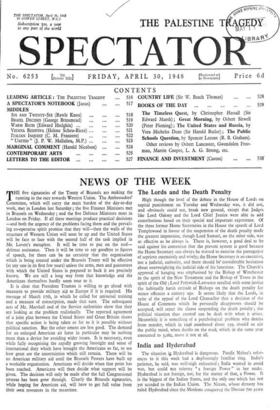The Lords and the Death Penalty
High though the level of the debate in the House of Lords on' capital punishment on Tuesday and Wednesday was, it did not, and obviously could not, break new ground, except that Judges like Lord Oaksey and the Lord Chief Justice were able to add contributions based on their special and important experience. Of the three former Home Secretaries in the House the speech of Lard Templewood in favour of the suspension of the death penalty made the greatest impression, though Lord Samuel, on the other side, was as effective as he always is. There is, however, a good deal to be said against his contention that the present system is good because the Home Secretary can always be trusted to exercise the prerogative of reprieve extensively and wisely; the Home Secretary is an executive, not a judicial, authority, and there should be considerable hesitation about overweighting the judicial side of his functions. The Church's approval of hanging was emphasised by the Bishop of Winchester in the spirit of the New Testament and the Bishop of Truro in the spirit of the Old ; Lord Pethwick-Lawrence recalled with some justice the habitually harsh attitude of Bishops on the death penalty for minor offences a century ago. It seems likely that the Lords, in spite of the appeal of the Lord Chancellor that a decision of the House of Commons which he personally disapproves should be accepted, will reject the clause suspending the death penalty ; the political situation thus created can be dealt with when it arises. Meanwhile it is something of a psychological problem why deaths from murder, which in 1946 numbered about 150, should so stir the public mind, when deaths on the road, which in the same year amounted to 5,062, move it not at all.






























